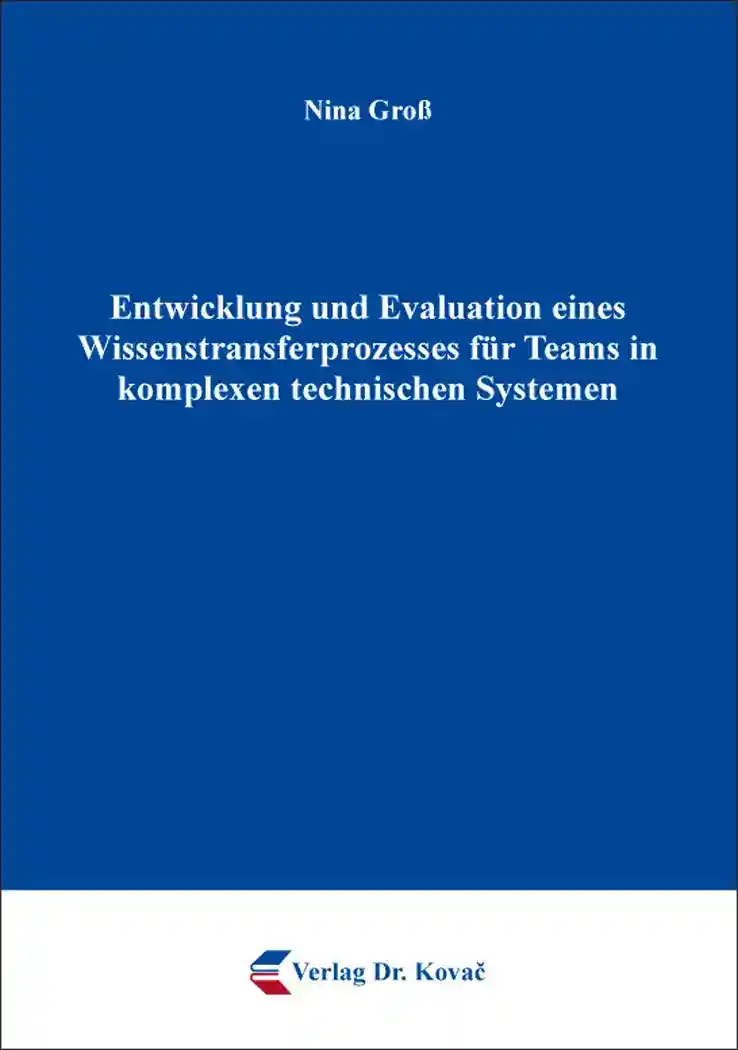Nina GroßEntwicklung und Evaluation eines Wissenstransferprozesses für Teams in komplexen technischen Systemen
Schriften zur Arbeits-, Betriebs- und Organisationspsychologie, volume 81
Hamburg 2017, 230 pages
ISBN 978-3-8300-9525-5 (print) |ISBN 978-3-339-09525-1 (eBook)
Rezension
[...] Das Buch verdeutlicht, wie durch den Einsatz von Wissenstransferprozessen Wissen und Erfahrungen aufbereitet und für andere verfügbar gemacht werden können mit dem Ziel, Fehler zu vermeiden oder zu reduzieren. Dabei betrachtet die Autorin Wissensmanagement als sozialen und kulturellen Prozess, der nicht auf ein ökonomisches oder technisches Problem reduziert werden kann. [...]
About this book deutschenglish
In closely linked, high hazard working environments, so called complex technical systems, errors can have fatal consequences for the employees, the organization, the environment or third parties. The application of wrong knowledge or the lacks of knowledge in general are factors that increase the probability that errors will occur. Knowledge transfer interventions are one approach to elicit knowledge and expertise (for instance of critical situations) and making them available to others in order to reduce errors. But, existing knowledge transfer interventions like knowledge circles, debriefings or the “Aufgabenbezogene Informationsaustausch” with all their benefits have only a limited transferability on teams in complex technical systems.
Against this background the present investigation deals with the empirical development and evaluation of a knowledge transfer intervention tailored for teams in complex technical systems. However, knowledge sharing is no matter of course yet, therefore individual and organizational antecedents that might increase knowledge sharing behavior were investigated first. Based on the empirical findings a knowledge transfer intervention was developed. The organizational antecedents that significantly influence the knowledge sharing behavior were considered as the main design criteria for developing the intervention for supporting knowledge sharing behavior in order to facilitate the development and perception of organizational antecedent. This knowledge transfer intervention is a continuous process that elicits individual knowledge and expertise of critical situations and transfers it to others. It links the characteristics and benefits of existing knowledge transfer interventions with aspects of the experience based pattern recognition, the Recognition Primed Decision Making.
In a next step, the developed intervention was implemented within ten teams of a complex technical system over a period of about one year to evaluate it. The similarity of the common required knowledge structures, the Shared Mental Models, served as the relevant evaluation criteria before and after implementing the knowledge transfers intervention. The results indicated a higher similarity of the Shared Mental Models after the implementation.
To sum up, it can be said that the present investigation provides interesting and beneficial findings for research and practice. On the one hand, it provides a contribution to established theories and on the other hand, a new knowledge transfer intervention tailored for teams in complex technical systems was developed and evaluated.
Keywords
ErfahrungswissenErhebungsmethodeHochrisikoindustrieKomplexe technische SystemePsychologieTeamsWissenstransferWissenstransferprozessIhr Werk im Verlag Dr. Kovač

Möchten Sie Ihre wissenschaftliche Arbeit publizieren? Erfahren Sie mehr über unsere günstigen Konditionen und unseren Service für Autorinnen und Autoren.
